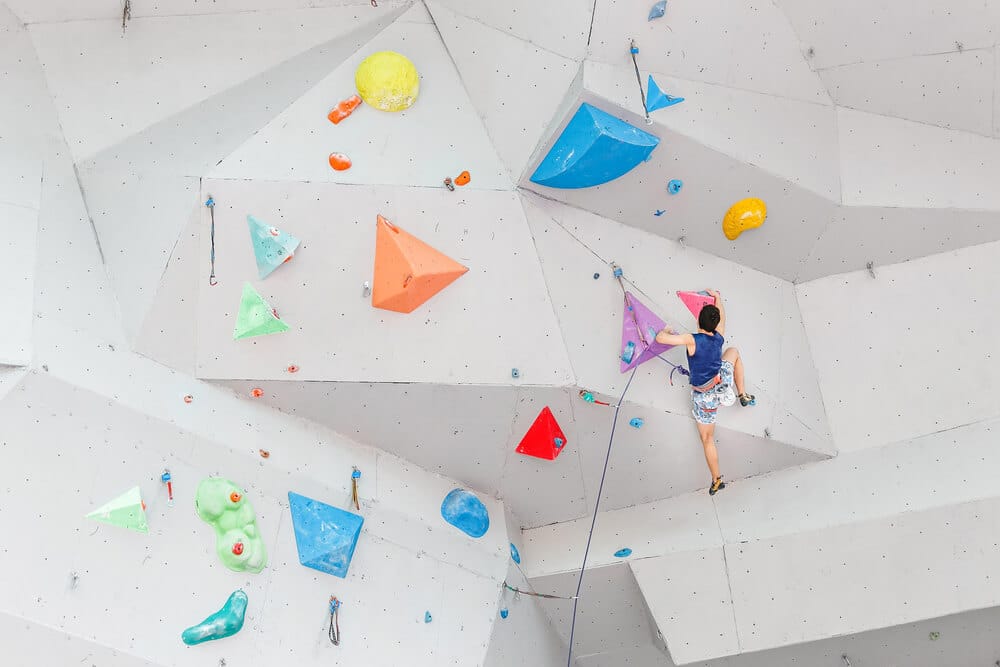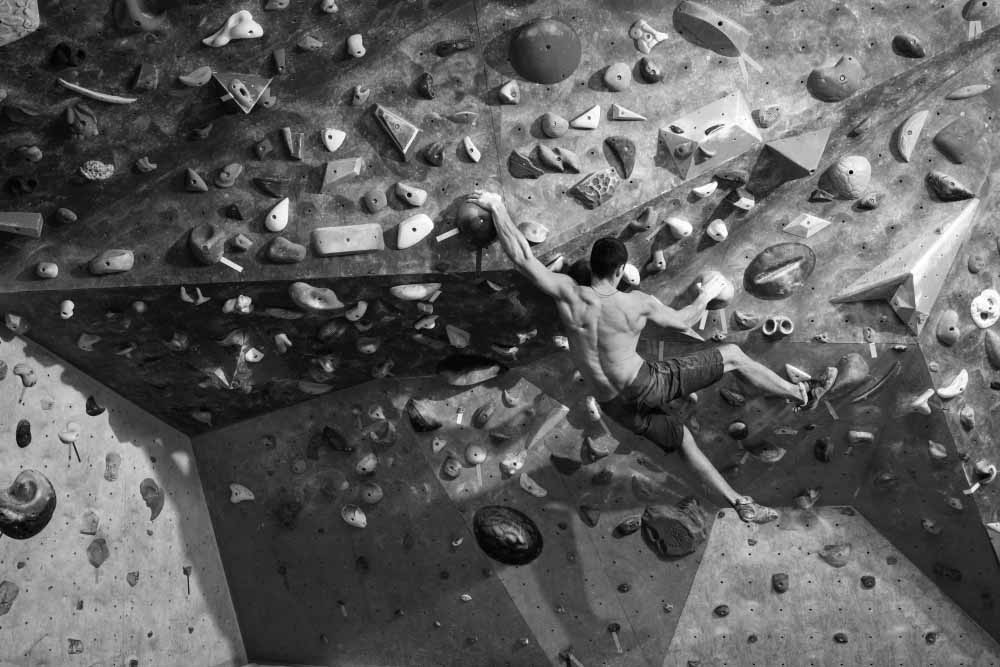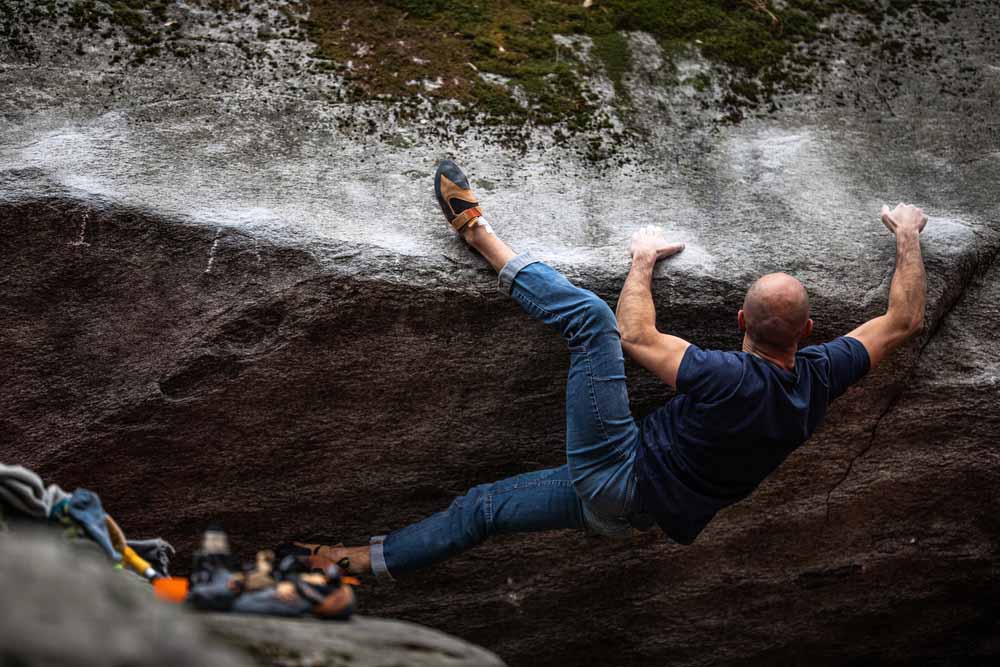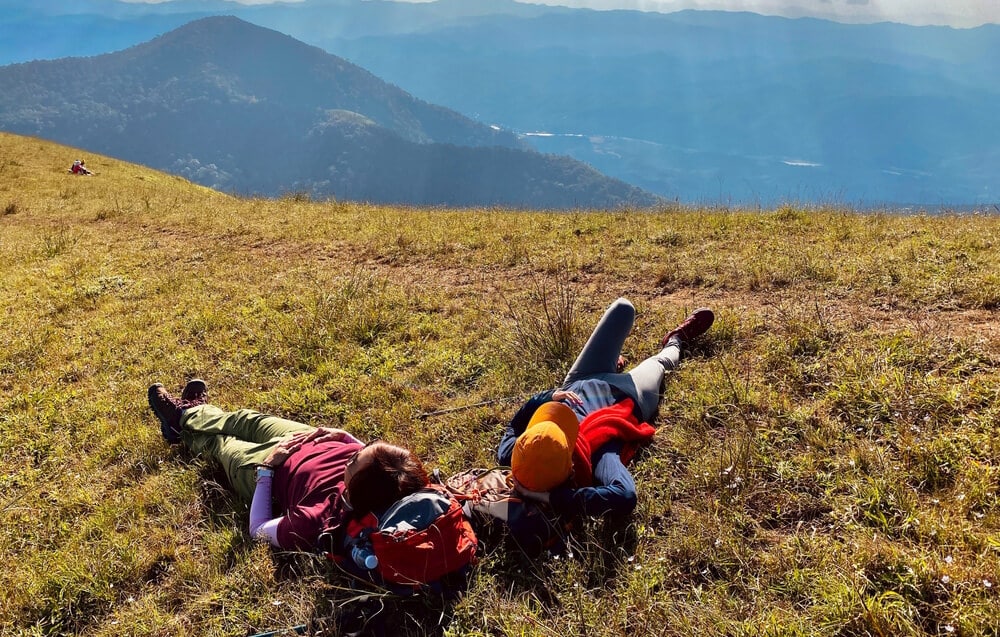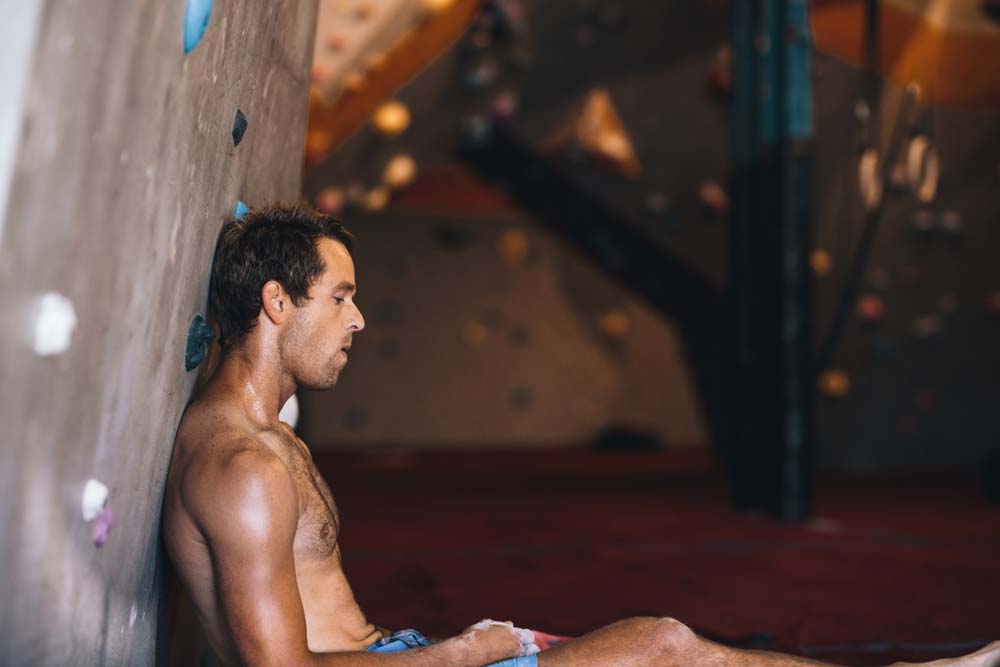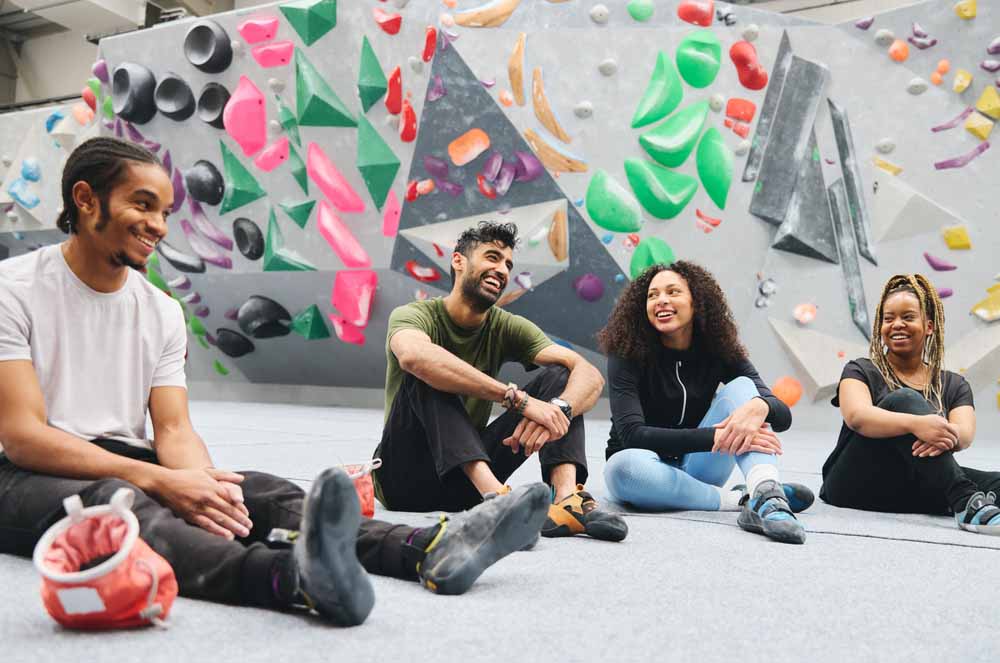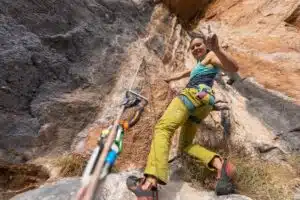Rock climbing can be a lot of fun, and many climbers find it satisfying to improve their skills and work towards new climbing goals. It’s obvious that heading to the gym or tying into a rope makes you better at rock climbing, but what may surprise many people is how going climbing can benefit them in other areas of their life.
As climbing becomes increasingly popular, more and more people might be wondering what the sport can do for them. Let’s take a closer look at some of the many rock climbing benefits: physical, mental, and social.
Physical health benefits
Everyone knows that getting regular exercise is important for your physical health, and many people stay active by spending time at the climbing gym or climbing outdoors. Rock climbing is a great way to fulfill your physical activity needs, especially since it boosts both muscle strength and cardiovascular capacity.
With the growth of indoor climbing gyms, rock climbing can easily be a year round sport! This means you can get your physical exercise from climbing in any season.
Improved physical strength
As you probably know if you’re a climber, rock climbing is a full body workout. To efficiently ascend the wall, you’ll need to use muscles ranging from your legs to your core to your shoulders and arms.
Rock climbing is great for building strength because it’s a varied activity. When you climb, you put your body into many different positions, which helps strengthen lots of different muscles. Some of the primary muscles that climbing targets include the shoulders, back, and forearms, but your biceps, triceps, and abs will get stronger too.
Different styles of climbing also build strength in different ways. Doing a short bouldering problem boosts the power of your muscles, while sport climbing improves your muscular endurance.
As a climber, you can have fun while you get stronger. If doing sit-ups alone on a gym feels boring, climb some overhung routes! This will boost your core strength and provide a lot more enjoyment.
Climbing may seem like an upper body workout, and it definitely is. If you’re a regular climber you’ll probably start to notice improved upper body strength in your everyday life. However, many people discover that it works your lower body muscles too! Things like heel hooks or slab climbing can help your legs get stronger.
Improved cardiovascular fitness
Another one of the physical benefits of climbing is improved cardio. Climbing might not feel like a cardio workout, but it is! Scientific data supports this idea; this study found that indoor rock climbing led to increased cardiorespiratory fitness.
If you want to improve your cardio, try to climb for longer periods of time at a lower intensity. Lead climbing or top rope climbing are better ways to improve your cardio than bouldering. When you’re sport climbing, the actual time that your heart rate is elevated is longer, boosting your cardiorespiratory fitness.
Improved flexibility and balance
When you’re on the wall, you have to learn to use your body in new ways and experiment with unusual positions. This helps boost your balance and flexibility!
This is important for your general well-being. Being flexible and having good balance aids in injury prevention and helps your body stay robust as you age.
Mental health benefits
The physical benefits of rock climbing might be the most obvious ones, but the ways in which climbing can benefit your mind might be even more important! As your climbing skills develop, your mental well-being might be improving too.
Mindfulness and flow
One thing that many climbers love about the sport is that it demands full focus; in order to climb a challenging route or boulder, you need to be fully engaged and in the moment. Because climbing requires so much problem solving, you really can’t be thinking about anything else.
This focus creates what psychologists call a “flow state“, which refers to a state of mind of being fully immersed in an activity or experience. It’s important to enter a flow state regularly, as it improves mood and provides a sense of meaning and accomplishment.
Rock climbing has also been shown to improve levels of mindfulness: this study found that climbing improved mindfulness levels significantly more than a traditional fitness program. Having higher levels of mindfulness helps reduce stress levels and has been linked with lower levels of anxiety and depression.
Dealing with fear
Climbing can be an exhilarating sport, and most climbers find themselves scared on occasion. Even if you’re an experienced climber, it’s part of the game to experience fear sometimes. Also this experience isn’t always fun in the moment, it can help you learn about yourself and improve your confidence in the long term.
Climbers who experience fear on a route and are able to work through it usually gain something valuable from the experience. I’ve had this experience on many different routes, and in the end it always reminds me that I am capable and strong. When you feel like something is too hard for you but you do it anyways, it helps boost your self-confidence and gets you ready for the next challenge, whether that’s a tricky route or a tough conversation you need to have.
Dealing with failure
As a rock climber, you’ll also have to get comfortable with failure. The majority of the time we get on a rock face or a climbing wall, we fail! We don’t send, we fall off. Getting comfortable with failure is a part of the sport, and it can help you outside of rock climbing too.
Most climbers fail enough that they start to accept the inevitability of that experience. Some days you can’t send anything, and some days you punt off the top move of your project. If you learn this doesn’t mean you should stop trying, you can apply that lesson to other parts of life. Getting rejected from a job doesn’t mean you shouldn’t apply for another one, and a tough breakup doesn’t mean you should give up on dating.
Boosts brain power
Most sports demand the use of both your body and brain, but rock climbing is one of the best for this. Spending time on the bouldering wall or on the sharp end of the rope can help improve your decision making, as you select beta and figure out the puzzle of a climb.
One of the mental benefits of rock climbing is that it can actually improve your cognition. One study found that a focused rock climbing session led to an increase in working memory capacity by a whopping 50%!
The problem solving necessary for good climbing encourages you to use your brain in new ways and builds new neural pathways. Regularly engaging in mentally challenging activities helps promote cognitive flexibility, which is important for fostering healthy cognition.
Encourages time outside
Indoor climbing can be a lot of fun, but if you climb regularly you might find that you want to explore the world of outdoor climbing. This brings us to another benefit of rock climbing– it encourages time in nature.
Amazing climbing exists in many beautiful spots, ranging from places in the American West like Joshua Tree National Park and Yosemite Valley to international destinations like Rocklands, South Africa and Kalymnos, Greece.
If you’re lucky enough to travel to any of these spots, or even just to visit your local outdoor crag, your mental well-being is likely getting a boost. Spending time in nature is linked with higher levels of positive emotions like joy and contentment and lower levels of mental health conditions like depression.
Social benefits
Being a climber is good for your body, but many people find that it improves their social life too. Even if you’ve only been climbing for a few months, you’ve probably noticed it is a a great activity to do with other people and an easy to way to make friends.
Builds community
If you are a climber, chances are you get at least some level of community from the sport. Whether you’re hanging out at the climbing gym or planning an outdoor trip with friends, climbing brings people together.
The climbing community can help people find connection, meaning, and a sense of belonging. Rock climbing is a challenging activity in many ways, and challenging yourself with others is a great way to bond.
Plus, talking to climbers is an easy way to start conversations! You can ask a stranger at the climbing gym what they’re working on, or ask people racking up in a parking lot what their plan is for the day. These types of interactions actually boost well-being, and they can lead to new friendships too.
Making new friends can be difficult, and climbing can be a helpful tool. Maybe you’ve had the experience of meeting someone you’d like to be friends with but being unsure of how to foster that relationship. If you’re both climbers, it’s easy to have an activity to do together. You can invite new friends to the climbing gym, or plan a day sending outside. Part of the point is to climb, but you’ll also have time to chat in the car or between routes.
Fosters deep relationships
Beyond providing a sense of community, being a rock climber can help deepen your existing friendships and relationships. When you climb, especially if you’re climbing with a rope, you have to fully trust in another person. This can be challenging to do, but learning to put that kind of trust in others fosters the kind of close relationships that many people struggle to create.
Climbing often puts people in a vulnerable state: it’s common to experience feelings of fear, inadequacy, and frustration. These negative emotions can be difficult, but experiencing them with others fosters deep relationships.
If you’re feeling scared or disappointed, your climbing partner will probably notice this. If you’re able to talk through the experience and share what you’re feeling, your relationship with the person will likely grow.
Improves communication skills
As a climber, there’s a lot you have to communicate. If you embark on a multi pitch with a climbing partner, you’ll have to learn how to communicate clearly so both of you stay safe and enjoy your time out.
Even if you’re not adventuring in the mountains, things like top rope climbing at the gym help improve communication skills too. You have to learn how to be a good belayer: does your partner like encouragement or quiet? Should you lower them right away if they ask or should you push them a little to keep going?
The social dynamics of rock climbing can be complicated, but learning to navigate them can improve your communication skills in other areas of your life too. For example, let’s say you have a friend who wants to learn to climb, and you decide to teach them. Teaching someone else something you know how to do forces you to learn to explain concepts clearly and check in with the other person to make sure they understand, both of which are applicable skills outside of climbing.
Conclusion
As more and more climbing gyms open worldwide, many people are experimenting with both outdoor and indoor climbing. Rock climbing is a physical and mental challenge that has a variety of benefits. Most sports don’t require so much problem solving, and the cognitive challenge of climbing is appealing to many.
Climbing is a full body workout, but it’s so much more than that! Many people love the sport because of the climbing community and the mental benefits it provides. As random as it seems, climbing walls can help you achieve balance in your life at large.


